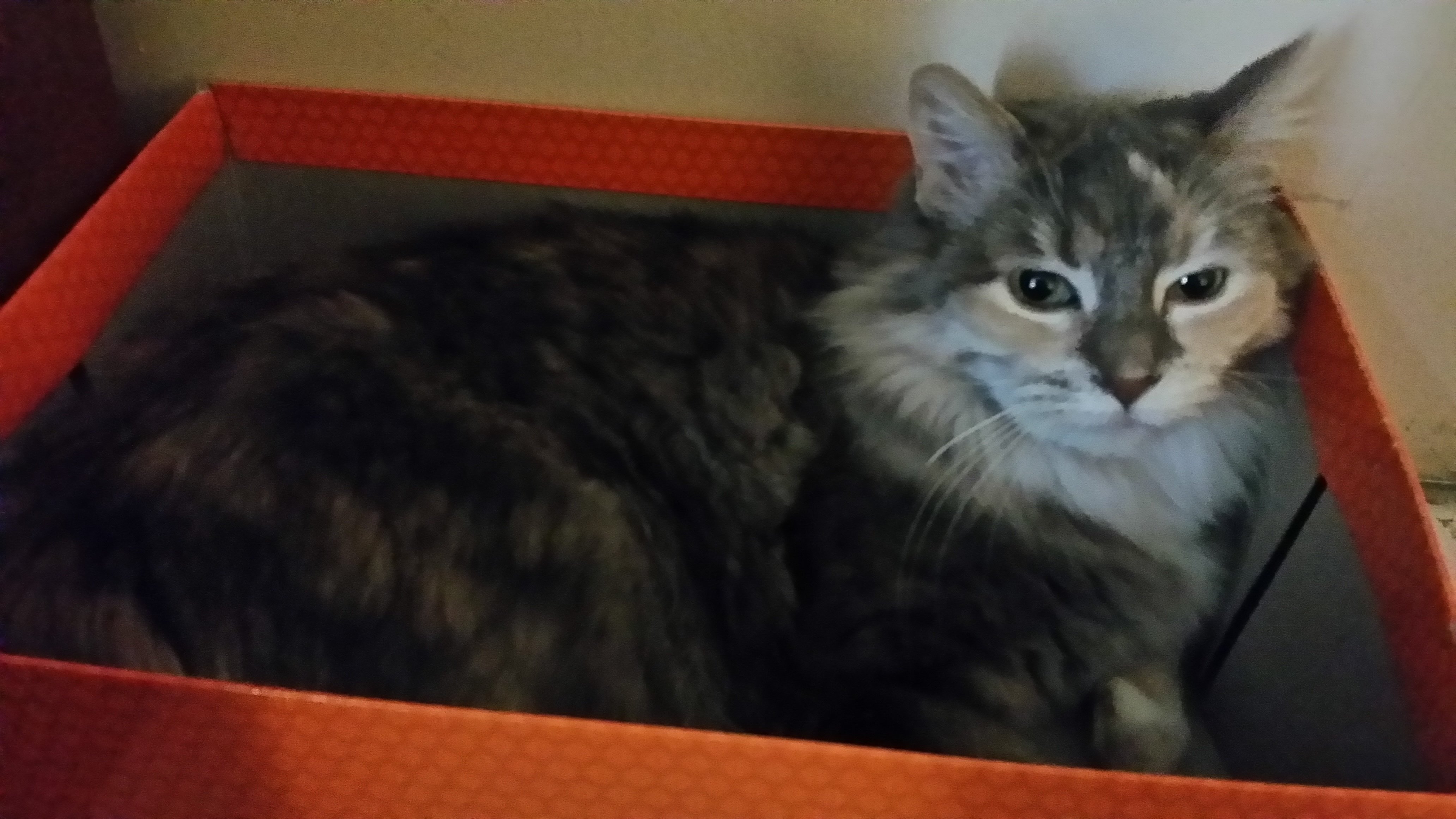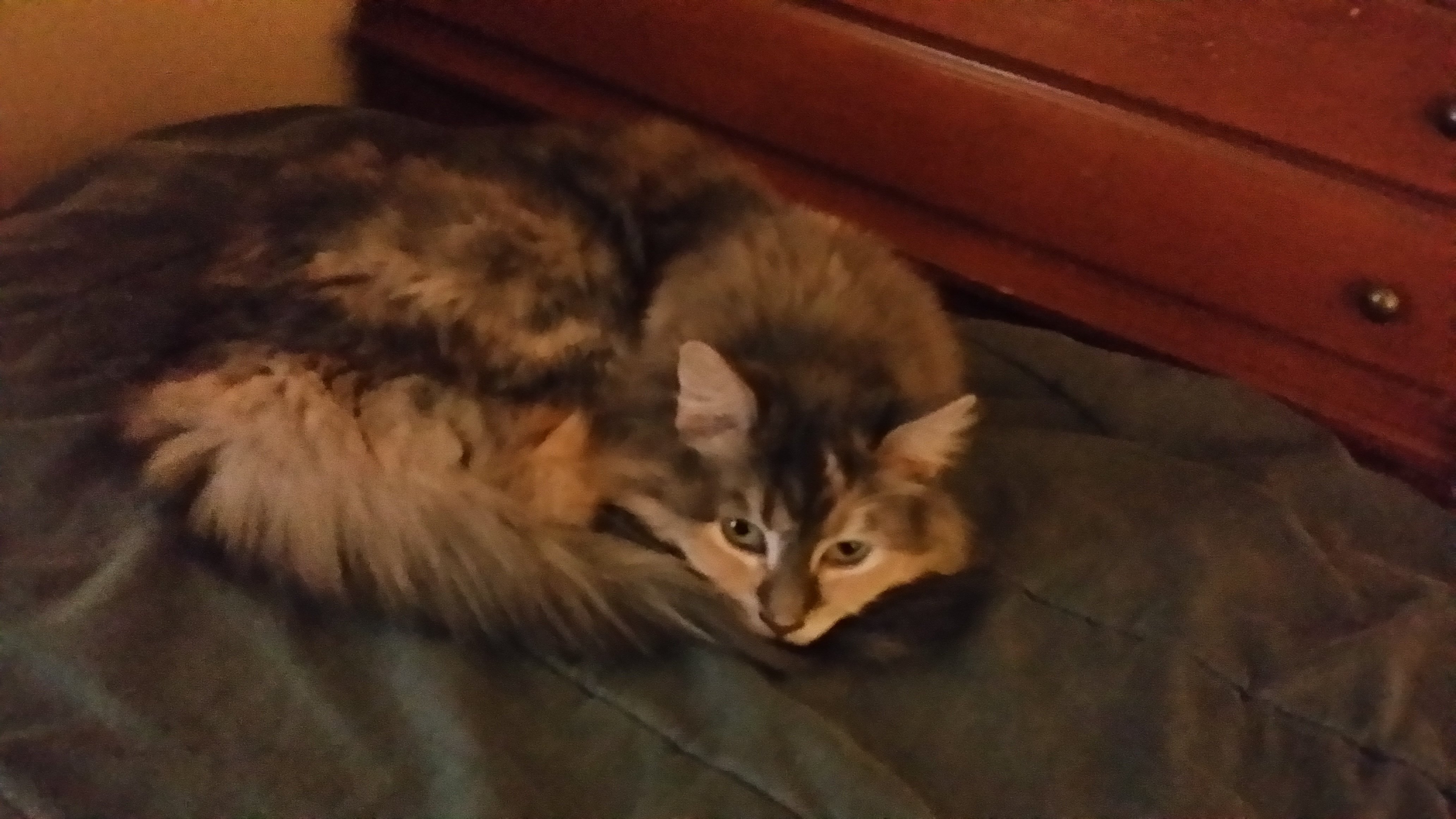

![]()


![]()


Hopefully it doesn’t get stuck as a glorified cache drive due to cost and forgotten like Intel’s Optane was.
At least orcas don’t do to whales what they do to sharks - eat their liver and leave them to die in agony.


It boggles the mind that any language - let alone a systems programming language that most of the world’s infrastructure is built upon - wouldn’t adjust their specification to eliminate undefined behavior wherever possible. And C++'s all seem to be in the worst possible places, too.


Or when someone read two sections and the teacher didn’t stop them.


Mouse, because the first thing she did when I brought her home was fall asleep on top of my computer tower.
Edit: more cat tax. I wish I had a better camera at the time.






My previous cat loved chin scratches, the harder the better. She’d throw her whole body weight down on your fingers, to the point I worried about hurting her. When she jumped up on something, before doing anything else she’d make sure to visit the corner and rub her chin against even the sharpest edges with distressing force. I swear she was a masochist or something.
Cats are weird. I miss her.
Edit: blurry cat tax.



Google started work on Carbon due to the difficulty of getting the C++ standards committee to accept any real, fundamental changes to the language. If Google, a grandmaster at manipulating standards committees, couldn’t get something passed, I don’t foresee this proposal getting anywhere.


Null safety is orders of magnitude simpler than memory safety. Kotlin is a null safe language by default. Java is infamously not. Anyone who has worked on a mixed-language Kotlin project can tell you how quickly null safety becomes a pain once guarantees break down - and that’s in a language where these issues are flagged instantly and you can “fix” the problem in a couple of characters! Mixed memory safe/unsafe codebases would be a nightmare in comparison.
Also, C++'s ecosystem consists of deeply entrenched libraries with ancient codebases. Safe C++ might be useful in a decade or two if library maintainers could be pushed to make the switch (good luck with that, if it’s half as much of a paradigm shift as Rust), but by then there will probably be multiple competing language features that claim to solve the same problem. It’s the C++ Way™.


Right, I should have specified isolated VM. WSL and Windows are interconnected (even if some things, like accessing Windows files within WSL2, are horribly slow). Google’s solution probably won’t have anything like that, given their reluctance to allow users access to Android’s underlying systems.
And to complete the trifecta, there’s also Aseprite for pixel art (it’s free if you compile it yourself).


18/f/California.
Jokes aside, this appears to be a full virtual machine rather than something like WSL that can interact with and manipulate the host OS. You probably won’t be able to do anything interesting with your Android files using it, just mess around in a sandboxed distro. So it’s still good for developers who want a portable Linux environment to run things in, but not nearly as useful as a properly integrated terminal would be.
Yes. Some (not all species) female mosquitoes drink blood for the protein, which they need for egg production. Their actual diet is nectar from flowers.


Let’s follow this adorable family of, I dunno, weasels or something. We’ll name every one of the dozen kits and give them each individual narratives, which will make it even more traumatizing when all but one of them are horribly killed and eaten on camera.
- Nature documentaries


Yeah, it’s twelve bucks to unlock scheduled backups and cloud syncing in Swift Backup, but then again this post is about paid apps. :)


Titanium Backup hasn’t been updated in five years, and I think that update was just to meet requirements to stay on the store. Their last changelog entry is adding the menu icon after Android ditched the physical menu button. There are a bunch of settings that are broken or do nothing due to changes to Android over the decades (TB has been around for so long that it supports Android 1.5).
I’ve been using Swift Backup as a replacement these past few years. It’s closed source but was recommended to me, and I haven’t run into any problems yet. Is Neo better in some way, aside from being FOSS?


8 changed a lot of UI for no reason other than to chase the mobile market. 8.1 reverted a lot of that and people liked it, but the damage to 8’s reputation had already been done.
If they kept the edition alive for a few years 8.1 might be remembered as a redemption story like Windows 98 Second Edition, but they rushed 10 out the door - as a free upgrade, no less - to get back the goodwill they’d lost.


Windows ME was a crapshoot. One of our computers blue screened a few times during the couple months we had it installed; the other couldn’t even run an hour without hard crashing.
Nowadays I can’t even remember the last time Windows crashed. Newer versions are definitely a lot more stable, though suck in different ways.


The funny thing is the whole commercialization process started with one of the future partners messaging the project lead out of the blue on LinkedIn. I don’t know about you, but taking ideas from a random LinkedIn user doesn’t strike me as good business sense.
Then again, getting something out of your years of unpaid volunteer work must be incredibly tempting, given how many open source projects have sold out over the years. At least it was to form an actual legitimate company this time, unlike when SuperSU (the Android root solution before Magisk came along) sold themselves to a scummy foreign ad company. That one still ranks as the all time top WTF sale.


Could be worse. At least it’s not Microsoft’s support forums:
Hey, I see you’re having problems with <copy-paste key words from OP>. Try the following and see if it fixes your issue.
Open a command prompt and enter ”sfc /scannow".
I hope this helps!
(Reply marked as solution, thread closed.)